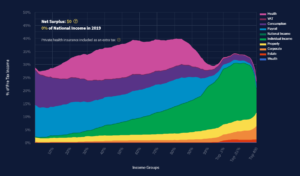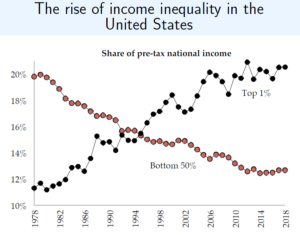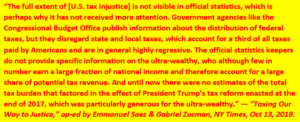This section of CTC’s web site covers the rationales for and means by which taxes on extreme wealth can shrink economic inequality and pay for new sustainable infrastructure decarbonizing the U.S. economy (the Green New Deal).
This page is primarily a landing point for our material on wealth taxes. The full action is in the sub-pages which you can access via the links below or by returning to this site’s Home Page and hovering over the Wealth Taxes button to activate the pull-down menu for the sub-pages.
This section draws heavily from research and writing by U-C Berkeley economists Emmanuel Saez and Gabriel Zucman. By incorporating state and local taxes, which tend to be highly regressive, by finely parsing tax incidence at the summit of the income pyramid, and by estimating changes in taxes from Trump’s 2017 tax cut giveaway, the two have created a rigorous and stark portrait of U.S. taxation inequality. (More in Saez and Zucman’s October 2019 op-ed, “How to Tax Our Way Back to Justice.”)
25 Richest in U.S. Pay Little in Income Tax, Trove of I.R.S. Data Shows
Our heading above is copied from the June 9, 2021 New York Times headline (print edition) to its story reporting on an analysis by the news organization Pro Publica, which obtained federal income tax records from 2014 through 2018 for the 25 wealthiest Americans including Jeff Bezos, Warren Buffett, Michael Bloomberg, Elon Musk and George Soros.
As described by the Times, “billionaires like Jeff Bezos and Elon Musk benefited from tax code loopholes and a focus on taxing income over wealth.” Among the Pro Publica findings:
- Collectively, the twenty-five paid only $13.6 billion in federal income taxes during a time period when their collective net worth increased by $401 billion; the ratio of taxes paid to increased worth was 3.4 percent.
- The “plutocrats” (to use the Times’ expression) benefit from “a complex web of loopholes in the tax code and the fact that the United States puts its emphasis on taxing labor income versus wealth.”
- A tax-minimizing technique used by the richest Americans is borrowing huge sums of money backed by enormous stock holdings. (Loans aren’t taxed, and the interest paid on the borrowed money can often be deducted from tax bills.)
The Times story noted that Sen. Elizabeth Warren (D-MA) has long sought a wealth tax equivalent each year to 2 percent of the wealthiest individuals’ net worths above $50 million.
“Increasing the personal income tax rate by 2 percent or 10 percent is not going to make any real difference to these multibillionaires,” Sen. Warren told the Times. “The real action in America is on wealth, not income.”
A brief digest of the Times’ June 9-10 coverage of the Pro Publica revelations:
- Wealthiest Executives Paid Little to Nothing in Federal Income Taxes, Report Says (source of the quotes above)
- The Real Tax Scandal Is What’s Legal (opinion column by Times editorial writer Benyamin Appelbaum)
- An Exposé Has Congress Rethinking How to Tax the Superrich (follow-up to the news story)
Guide to Our Wealth Tax Material
Our first sub-page, Inequality Basics, outlines the discussion of economic inequality that surfaced around 2011 and now, in 2020, is a dominant strain in American political discourse.
The next, Taxing Extreme Wealth, is a guide to the promises and pitfalls of varying approaches to extracting tax revenue from (and reducing the unconscionably large magnitudes of) America’s biggest family fortunes.

Current (2018-2019) U.S. Tax System, by income group and tax type. Full view at “Taxing Extreme Wealth” page.
The Public Opinion page reports polling data and other indicators of public sentiment on taxing the wealthiest U.S. households.
Future pages will elaborate on this material, including the necessity and morality of wealth taxes as well as quantification of revenues depending on particular tax scenarios.


